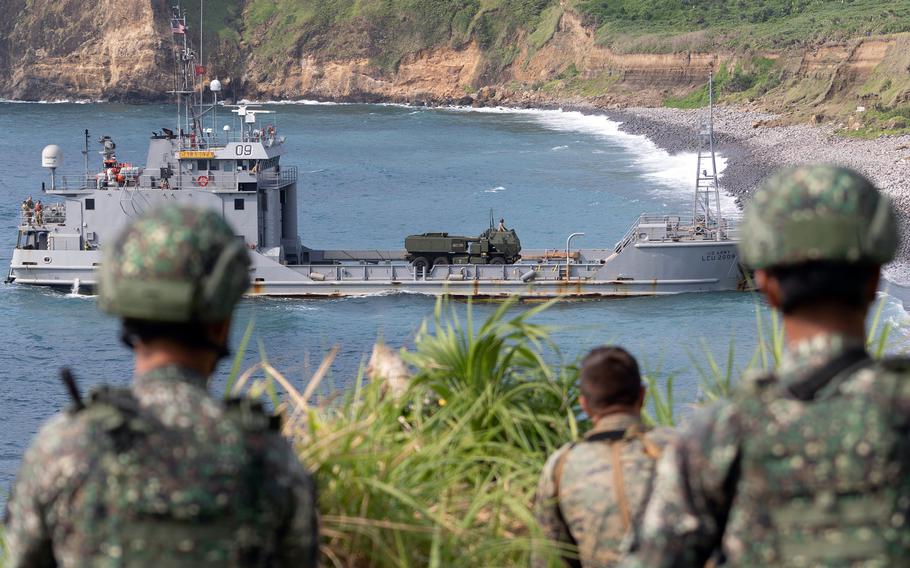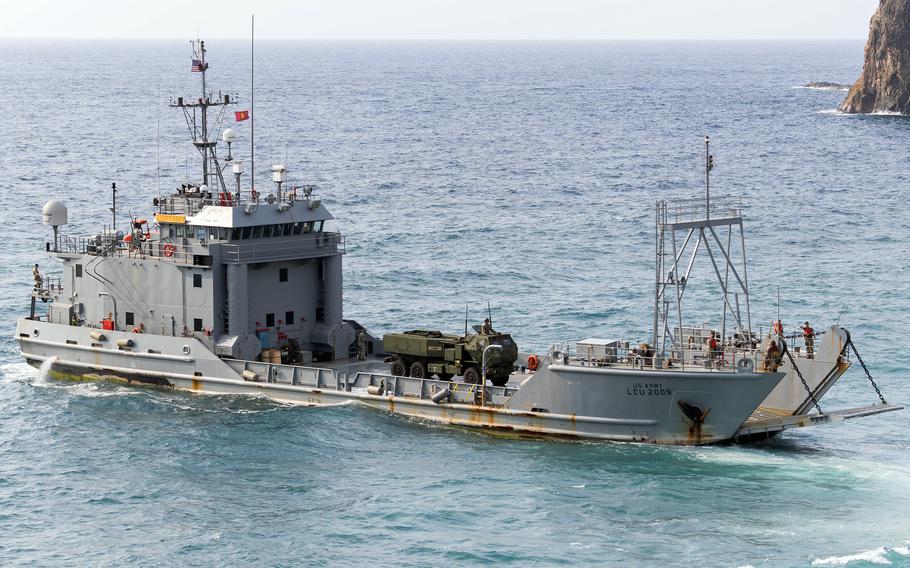
The USAV Calaboza transports a High Mobility Artillery Rocket System, or HIMARS, during Balikatan training in the Philippines, April 23, 2023. (Paley Fenner/U.S. Marine Corps)
CAMP ZAMA, Japan — A U.S. Army watercraft unit equipped with more than a dozen transport vessels will be homeported in Japan, the commander of U.S. Army Pacific told soldiers during a recent visit to this base in Kanagawa prefecture.
“We have a composite watercraft company with 13 ships and 285 Army mariners permanently coming to Japan,” Gen. Charles Flynn said at Camp Zama, 26 miles southwest of central Tokyo, on June 20. Flynn revealed the move while presiding over a ceremony that saw Maj. Gen. Joel “JB” Vowell relinquish command of U.S. Army Japan to Maj. Gen. David Womack.
U.S. Army Japan declined a request to photograph the watercraft or interview soldiers about the vessels and referred questions about the unit to U.S. Army Japan and U.S. Forces Japan. USFJ didn’t respond to emailed questions last week and U.S. Army Pacific couldn’t be reached over the long holiday weekend.
A composite watercraft company includes five landing craft utility vessels, two tugboats, four maneuver support vessels and a harbormaster operations detachment to provide maintenance, according to an Army news release from May 24, 2021.
Japanese troops toured an Army landing craft utility vessel — the USAV Calaboza — at Yokohama North Dock in January, the Army announced in a news release at the time.

The USAV Calaboza transports a High Mobility Artillery Rocket System, or HIMARS, during Balikatan training in the Philippines, April 23, 2023. (Paley Fenner/U.S. Marine Corps)
LCUs — used for getting personnel, gear and supplies to shore — are small but boast the same payload capacity as seven C-17 Globemaster III aircraft, according to release. One LCU can carry up to five M1 Abrams tanks, 24 double-stacked shipping containers or 400 combat-equipped troops.
Japan’s army doesn’t have watercraft and relies on its Maritime Self-Defense Force and civilian ships to transport troops and equipment by sea, according to the January release.
“Today’s visit is kind of a lesson learned for us,” Col. Motokazu Suzuki, operations chief for Japan’s Central Army, who toured the vessel, said in the release. Japan’s army is considering acquiring watercraft, he added.
The U.S. Army operated 127,000 watercraft during World War II, according to the 2021 news release, which stated that the total force in the Indo-Pacific had since declined to six operational watercraft and 35 pre-positioned stock vessels.
In recent years, Army watercraft have been involved in training in Japan, Guam and Australia, transporting equipment such as the High Mobility Artillery Rocket System, or HIMARS, according to the release.
“Army watercraft are useful boats for moving people, equipment, and supplies between scattered islands — especially in fairly close together archipelagoes,” said Grant Newsham, a senior researcher with the Japan Forum for Strategic Studies in Tokyo.
“They aren't very big so they can get into places and operate closer to the shore — if not right up on the shore — than can bigger more 'conventional' transports,” he told Stars and Stripes in an email June 27. “Also, they don't attract so much attention since they are small and non-descript.”
Such vessels could meet the Marine Corps’ requirement to transport small units to far-flung islands in a conflict, Newsham added.
“But the Army doesn't want to share or give up its resources,” he said. “That's not surprising, since the US Army is angling big-time for a role in a future fight in the Pacific. And they don't mind, and some would say are trying, to displace the US Marine Corps and its role in the Pacific.”